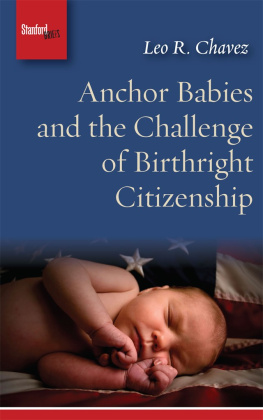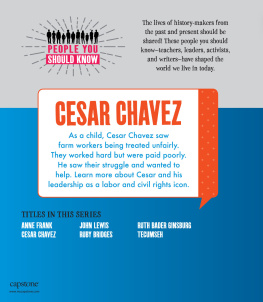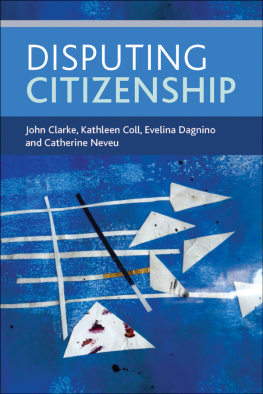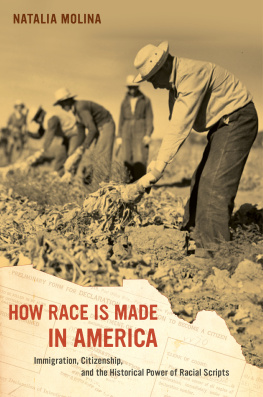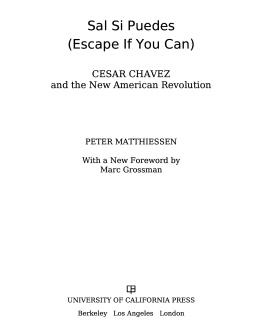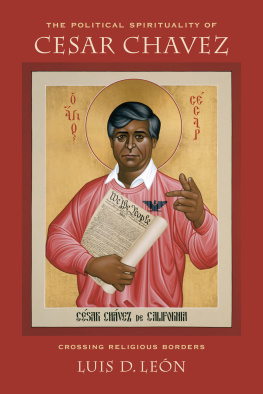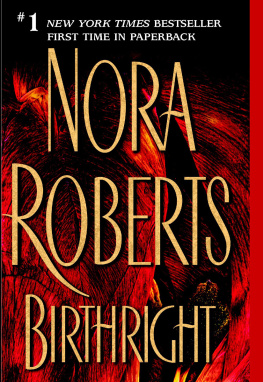Stanford University Press
Stanford, California
2017 by the Board of Trustees of the Leland Stanford Junior University.
All rights reserved.
No part of this book may be reproduced or transmitted in any form or by any means, electronic or mechanical, including photocopying and recording, or in any information storage or retrieval system without the prior written permission of Stanford University Press.
Printed in the United States of America on acid-free, archival-quality paper
Library of Congress Cataloging-in-Publication Data
Names: Chavez, Leo R. (Leo Ralph), author.
Title: Anchor babies and the challenge of birthright citizenship / Leo R. Chavez.
Description: Stanford, California : Stanford Briefs, an imprint of Stanford University Press, 2017. | Includes bibliographical references.
Identifiers: LCCN 2017033752 | ISBN 9781503605091 (pbk. : alk. paper) | ISBN 9781503605268 (ebook)
Subjects: LCSH: CitizenshipUnited States. | Children of illegal aliensLegal status, laws, etc.United States. | Children of immigrantsLegal status, laws, etc.United States. | United States. Constitution. 14th Amendment. | United StatesEmigration and immigrationGovernment policy.
Classification: LCC JK1759 C6 2017 | DDC 323.6/2dc23
LC record available at https://lccn.loc.gov/2017033752
Typeset by Classic Typography in 10/13 Adobe Garamond
PROLOGUE
Donald Trump launched his campaign to become the 45th president of the United States by disparaging Mexican immigrants: When Mexico sends its people, theyre not sending their best. Theyre not sending you. Theyre not sending you. Theyre sending people that have lots of problems, and theyre bringing those problems with us. Theyre bringing drugs. Theyre bringing crime. Theyre rapists. And some, I assume, are good people.
As shocking and incendiary as these characterizations of Mexican immigrants were, Trumps less noticed comments about U.S.-born children of undocumented immigrants also deserved notice. Mr. Trump called these children anchor babies, a term that had become part of public discourse only a decade earlier, to suggest these children were not real citizens because their parents were undocumented immigrants who bore these children in the United States in order to get citizenship for themselves. In other words, anchor babies are part of an alleged conspiracy to take advantage of the United States. Trump said anchor babies might not be citizens or have a legal right to live in the United States. Id much rather find out whether or not anchor babies are citizens because a lot of people dont think they are.
So-called anchor babies are born in the United States and thus acquire citizenship as a birthright. Birthright citizenship is one of the pillars of our nations laws and one of the key values that make America great. To be born in the United States makes one a citizen and symbolizes an inclusiveness often lacking in many countries of the world. Was Trump really questioning the citizenship of people born in the United States?
Birthright citizenship is based on the principle of jus soli, which means right to soil. Jus soli is the right to claim citizenship as a result of being born in the territory of a state. Although a key principle in American legal history, jus soli or birthright citizenship has not always been bestowed on all those born on American soil. Native Americans, African American slaves, and the children of nonwhite immigrants were left out for much of our history. The Fourteenth Amendment to the U.S. Constitution guarantees citizenship to all babies born in the United States: All persons born or naturalized in the United States, and subject to the jurisdiction thereof, are citizens of the United States and of the State wherein they reside. Even after acquiring birthright citizenship, the children of immigrants and other stigmatized ethnic or racial groups often found their citizenship diminished by laws and social attitudes about their deservingness and belonging to the nation.
The children of immigrants have long held a tenuous position in American society.
Anchor baby is a decidedly more provocative and offensive term than birthright citizenship. It perpetuates the idea of a conspiracy by undocumented immigrants who choose to have a U.S.-citizen baby to be able to apply, someday, for his or her familys legal residence.
The term anchor baby first appeared in the 1980s, although in an academic rather than a political context. A 1987 article in the Los Angeles Times Magazine profiled Kenji Ima and Jeanne Nidorf, two San Diego State University professors, and their research on troubled Southeast Asian teens. They [Southeast Asian teens] are anchor children, saddled with the extra burden of having to attain a financial foothold in America to sponsor family members who remain in Vietnam.
I also used the anchor metaphor in Shadowed Lives: Undocumented Immigrants in American Society.
But this effect had a completely different meaning from what ultimately emerged with the term anchor baby in the early 2000s. Take, for example, conservative pundit Michelle Malkins comments about anchor babies in her blog entry for June 13, 2004:
In 2005, Malkin again linked birthright citizenship to undocumented immigration and post9/11 fears of terrorism: Clearly, the custom of granting automatic citizenship at birth to children of tourists, and temporary workers... and to countless anchor babies delivered by illegal aliens on American soil, undermines the integrity of citizenshipnot to mention national security.... The citizenship clause has evolved into a magnet for alien law breakers and a shield for terrorist infiltrators and enemy combatants.
As the rhetoric around anchor babies heated up, citizens suddenly found themselves targets of anti-immigrant discourse and even policies. In 2010, Floridas higher education administrators began treating so-called anchor babies as nonresidents of the state if they could not prove their parents were legal immigrants. From nine to twelve thousand U.S.-citizen students were immediately affected by the ruling, and yet they had to endure what must have seemed a form of punishment for their parents decision to come to the United States.
Six years later, even candidates for president of the United States routinely referred to anchor babies in a pejorative sense. Donald Trump told his supporters that women were crossing the border to deliver their anchor babies and that Americans were disgusted when a woman whos nine months pregnant walks across the border, has a baby, and you have to take care of that baby for the next 85 years.
The relatively sudden appearance of the term anchor baby had dictionaries scrambling, and stumbling, to define it. In 2011, the American Heritage Dictionary defined anchor baby as a child born to a noncitizen mother in a country that grants automatic citizenship to children born on its soil, especially such a child born to parents seeking to secure eventual citizenship for themselves and often other members of their family.
In the heated political discourse over anchor babies, both these definitions could hold true depending on who was using the term. But even these two opposing definitions do not capture the negative stereotypes that would become associated with the anchor In other words, to those using the term as a political dog whistle, anchor babies symbolize a threat to the American way of life.

